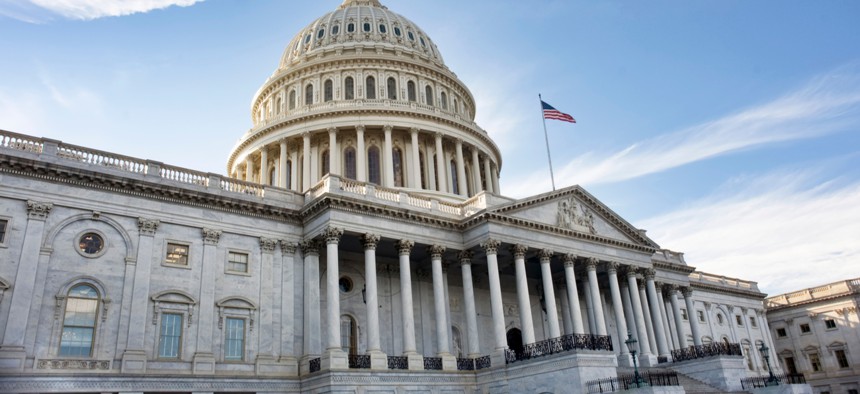
U.S. Capitol Shutterstock.com
Employee Groups Object to Congressional Inaction on Pay Raise
A weekly roundup of pay and benefits news.
A House panel on Wednesday advanced spending legislation that protects federal workers from the Trump administration’s perennial efforts to cut federal benefits but did not improve on a 1% across the board pay raise proposed by President Trump for 2021, rankling labor leaders.
The Financial Services and General Government subcommittee on the House Appropriations Committee elected by voice vote to recommend its portion of the fiscal 2021 spending package to the full committee for consideration without amendments.
The bill blocks a number of controversial White House initiatives, including the proposed merger of the Office of Personnel Management and General Services Administration and prevents federal agencies from enforcing any union contracts that have not been “mutually and voluntarily agreed to” by all parties, retroactive to April 30, 2019, a provision that would effectively nullify all new collective bargaining agreements implemented over the last 14 months.
Appropriators also declined for a fourth consecutive year to institute a cavalcade of cuts to federal employees’ retirement benefits proposed in the White House’s 2021 budget request. Those proposals included requiring employees enrolled in the Federal Employees Retirement System to contribute an additional 1% per year to their retirement accounts until both employees and the government contribute 50% and eliminating cost of living adjustments for future FERS retirees and reducing COLAs for retirees in the Civil Service Retirement System by 0.5%.
The Trump budget also called for the elimination of the FERS special retirement supplement, designed for employees who are forced to retire before they hit the Social Security eligibility age of 62, and it suggested basing retirees’ annuities on their highest five years of salary, rather than the current “High-3” model. The administration also proposed basing the rate of return on the Thrift Savings Plan’s G Fund, which is made up of government securities, on the yield of one of the short-term Treasury bills, a move that experts and officials at the TSP say would make the fund useless for investors.
But unlike previous years, when House Democrats proposed as much as 3.1% in increased pay for federal workers on average, lawmakers did not offer an alternative to the president’s compensation plan this year. If left unamended, federal employees would receive a 1% across the board increase in basic pay and no adjustment to locality pay in 2021.
Officials at unions and other federal employee groups condemned lawmakers’ inaction on pay during the appropriations process, although they said they appreciated other elements of the bill.
“NTEU is disappointed that the House Financial Services and General Government appropriations bill is silent on a pay increase for federal employees in 2021,” said Tony Reardon, national president of the National Treasury Employees Union. “We believe a fair pay increase is warranted for this frontline workforce that has helped keep this country running during the global health crisis . . . We applaud the language included in the draft legislation that protects employees’ collective bargaining rights.”
Ken Thomas, national president of the National Active and Retired Federal Employees Association, said federal workers deserve fiscal stimulus for their efforts to guide the country through the coronavirus pandemic.
“Over the past few months, Congress approved spending trillions of federal dollars in response to the COVID-19 pandemic—to fund the federal and community response to the outbreak, and to provide financial relief to businesses and individuals,” he said. “And the House continues to vote in favor of additional relief, health care spending, infrastructure investments and soon, annual appropriations. But when it comes time to provide a modest pay adjustment to the federal workers it relies on to carry out that federal policy and spending, House appropriators find themselves empty-handed and poverty-stricken.”







